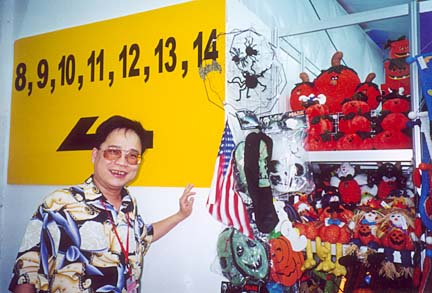


|
Look out the window on the train from Hong Kong to Guangzhou and see China change before your eyes. Governor leads trade
mission to ChinaBy Craig Gima
cgima@starbulletin.comYou'll pass pockets of rural farmland where people still make their living growing bananas and other crops. But the rural landscape is disappearing as cities like Shenzhen in Guangdong province expand.
When China began reforming its economy, Shenzhen, just outside of Hong Kong, was chosen as a Special Economic Zone launching an economy based on foreign investment, manufacturing and export.
That's why Gov. Ben Cayetano, first lady Vicky Cayetano, state government and tourism officials, business people and educators are in China on a trade mission to Beijing, Shanghai, Guangdong and Hong Kong.
The state Department of Business, Economic Development & Tourism is spending at least $27,000 on the two-week trip and about $85,000 this year to increase trade between China and Hawaii.
Cayetano said the delegation of 64 people will help promote tourism, but more important, alert Chinese officials and businesses to Hawaii's value in international trade.
"It is important to market the profession expertise in Hawaii, whether it be resort development ... or our engineers who have developed knowledge in environmental pollution -- all those areas that the Chinese are now lacking," Cayetano said.
The governor signed an agreement yesterday in Beijing with the Beijing Tourism Group encouraging cooperation on tourism development in China.
He is scheduled to sign an agreement today in the Great Hall of the People with the World Trade Center Associations of Hong Kong to send groups of senior officials from China's interior provinces to Hawaii -- at WTCA expense -- for training in business and public administration, tourism and agriculture.
The Western China Training Initiative agreement could be worth "several million dollars a year," said DBEDT's Richard Bahar. However, details are still being worked out.
"I don't think we're sending sugar cane or pineapples out to China, but we can send a lot of expertise out," said George Berean, a vice president at Hawaii architectural firm Wimberly Allison Tong and Goo.
Berean, who is traveling at his firm's expense with the state delegation, said his company already has 12 projects in China and sees the potential for more business than it can handle as the country prepares for the 2008 Olympics.
"We're trying to hold it (growth in their China business) to 30 percent a year."
But not all Hawaii businesses are bullish on China. Hawaiian Electric Industries is not represented on the trip. In 1998, HEI signed a $100 million contract to buy into a joint venture to build and operate a power plant in Inner Mongolia. The deal went sour and HEI lost about $25 million.
"We had a valid contract, and we could not get it enforced," said HEI President Bob Clarke. "There's no reliable legal system."
The risks of doing business in China have not discouraged Hawaii software company Dimensia Inc. from planning to sign an agreement with Greater China Technologies when the Hawaii delegation arrives in Shanghai this week.
Dimensia President Kevin Horio said that under the agreement, GCT will write software for his company at "much lower than what it costs to pay programmers in the U.S."
Dimensia does a lot of business with East Coast companies. Because of overlapping time zones, Hawaii's location is ideal for doing business in both China and the mainland, Horio said.
Hawaii venture capitalist Ted Liu, who helped organize part of the trip, is hoping to interest Chinese companies in investing in Hawaii high technology and biotechnology development. "There is no reason why, from a research perspective, Hawaii cannot be a center drawing the best minds from us and the best minds from Asia to tackle some of the biomedical problems Asia faces," Liu said, pointing to research being done in Hawaii on tropical diseases like dengue fever.
In Guangzhou, the city formerly known as Canton, the delegation plans to hold a tourism seminar and education fair to talk about increasing education and training exchanges.
In a meeting with journalists on an East-West Center program in October, Grant Jinde Chen, the vice secretary-general of the Guangzhou municipal government, cited tourism development, engineering, marine sciences and biomedical research as areas where Hawaii may be able to offer expertise.
In Guangzhou and the rest of Guangdong province, where most of Hawaii's Chinese immigrants came from, the government is feeding the economic boom by attracting high-tech industries and developing its service sector.
At the Canton Trade Fair held in October, the variety of manufactured goods made in China and sold in the United States and around the world was on display for buyers.
Among those selling their wares was Lim Yiquing, whose factory in the Shantou Special Economic Zone makes American flags and other products. Orders, he said, have doubled.
Chuck Gee, who will lead a presentation on tourism in Guangzhou, also notes that Hawaii has stiff competition in peddling its expertise to China.
"Singapore, Hong Kong and Southeast Asian destinations have a great deal of experience in tourism and development," said Gee, dean of the University of Hawaii School of Travel Industry Management. "Europeans also are out there selling services."
University of Hawaii-Hilo Chancellor Rose Tseng said: "Every major university is checking into the Chinese market. We're not ahead but we're not behind, either."
Added Gee: "If you don't go, then there won't be any recognition of your interest at all. Even if it's only 50-50 (chance of success), you have to make the effort."